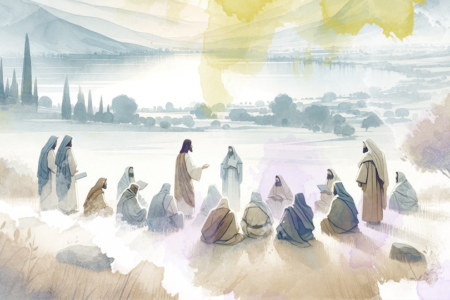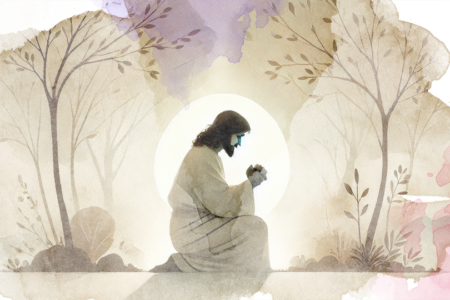Five Minutes with the General Director Jun/Jul 1977
Hurdles Jews Must Clear
Paul wrote to the believers at Corinth, “But we preach Messiah crucified, unto the Jews a stumblingblock … “(I Cor. 1:23). The stumblingblock the Jews faced was not the mode of communication — PREACHING, nor was it the subject — MESSIAH; no, the obstacle lay in one descriptive word – CRUCIFIED.
The Jewish people of the first century were anticipating a Messiah who would come in the train of David; One who would appear in power and majesty; a Messiah who would deliver them from the oppressive heel of the hated Romans. A crucified Messiah was, therefore, to the Jewish mind unintelligible and to his heart distasteful — an inexplicable enigma that cut across everything he had been taught and which he had believed. The fact that the Messiah must first suffer and die for the world’s sins before reestablishing the Davidic kingdom escaped the Jewish leadership.
Peter spoke of the “sufferings of Messiah and the glory that would follow” and suggested that the chronology of these events was considered in the Old Testament. But the Jewish people of Christ’s day majored in the latter and rejected the former. They longed for the glory and ignored the suffering. Two thousand years of history has not altered the situation. A crucified Messiah is still a stumblingblock. Most happily, however, increasingly large number of Jews are beginning to face the issue of a crucified Messiah, and many are clearing the hurdles in their race toward peace, purpose and eternal life through Israel’s Greatest Son.
HURDLE I: CONVERSION
To the Jewish mind today, “conversion” is popularly construed to mean a denial of one’s heritage, a rejection of the Jewish faith and the acceptance of another religion. This concept, though totally erroneous, stands as a major hurdle which Jews must clear in the race for life.
The Jewish encyclopedia states that “Conversion is the Biblical term for the turn of a sinner from his evil ways to God.” The encyclopedia continues, “There can be no conversion without change of heart and conduct; that is repentance of sins committed (Deut. 30:2, Isa. 55:7; Jer. 24:7; Ezek. 18:27).” Both the Hebrew and Greek words translated “conversion” literally mean “turning from one thing to another.” The Scriptures make it clear that in context where conversion is the topic, man must turn to God from his present position. Conversion should never be misconstrued as meaning that a Jewish person who accepts Jesus Christ becomes a Gentile, thereby ceasing to be a Jew. Similarly, when a Gentile accepts Jesus Christ, he does not cease to be a Gentile.
In the Old Testament God repeatedly called upon Israel to be converted. King David wrote in Psalm 51:13, “Then will I teach transgressors thy ways; and sinners shall be converted unto thee.” And hear the Sovereign of the universe speaking to the Prophet Isaiah, Make the heart of this people fat, and make their ears heavy, and shut their eyes; lest they see with their eyes, and hear with their ears, and understand with their heart, and convert, and be healed. Isaiah 6:10
It was not being suggested that Jews become Gentiles. Rather, they were being urged to turn to God from their sin.
Since all are sinners, and all have gone astray, all must be converted. But this in no way intrudes upon or negates one’s heritage.
HURDLE II: PERSECUTION
As a youngster growing up in the streets of Philadelphia, the only time I heard the name of Christ was when it was used as a curse word or when a gang from a neighboring community came over to start a fight. Often the catalyst was a derisive heckle of “Christ killer”.
But persecution of the Jew is nothing new. The Egyptians, Assyrians, Babylonians, Medes, Persians and Greeks — each wanted a piece of the action and rose up to oppose, to persecute, to imprision, to murder and to plunder the descendants of Abraham through Jacob. On this side of Calvary, Rome, the Crusaders, the Spanish Inquisition, the Russian Pogroms and the Nazi Holocaust are representatives of continous persecution of the Jew. Regrettably, all too often Christendom, in the name of Christ, spearheaded the attack. And regrettably, Jewish people are not sufficiently familiar with the facts of church history to distinguish between genuine Bible believing Christianity and heathen Christendom. To ask a Jew to become a Christian is an exercise in futility unless and until a careful distinction is made between true Christianity and Christendom in Its popular and broadest scope. A loving, patient and tactful witness by a concerned Christian can go far in helping a son of Israel clear the hurdle of persecution.
HURDLE III: TRADITION
Tradition, like a strong prison, can hold a man captive . If the tradition is true and ennobling, then such captivity can be liberating. If it is untrue and unyielding, then captivity becomes confining. “Fiddler on the Roof” illustrates the power and influence of Jewish tradition.
I have witnessed to Jewish people who have said, “Even if it’s true, I can’t believe it; it goes against everything I have ever been taught.”
I have had others fearfully say, “I believe that Jesus is my Messiah and Saviour, but what would my family think if I make a public profession of faith.”
There is a game children play. Standing in a line, a large word is relayed through whispers from the first to the last child. The last child must then announce what the original word was. Invariably, the word becomes distorted in the process of transmission.
God, through the Bible, communicated His Word to mankind. Through the centuries of evolving Talmudic and rabbinic tradition that Word has been distorted. To bypass the erroneous tradition of men and return to the truth of God may take courage, but it is both logical and consistent with genuine Jewish heritage. More and more Jews are clearing the hurdle of empty tradition to experience the fullness of life in Christ.
HURDLES CAN BE JUMPED
During basic training in the Marine Corps our platoon was taken to the rifle range. The drill instructor asked, “How many of you have fired rifles before?” A number of the men raised their hands certain that they would have an advantage. The instructor responded, “That’s too bad because now I’m going to have to correct all of your wrong habits so that I can teach you the right ones.” In a very real sense, that is the difficulty one faces in presenting the Good News to Jewish people. Over the centuries they have been given a distorted picture of the person and work of Christ — and that distortion must be corrected before they will respond to a positive presentation of the Gospel.
One day Peter and John were going to the Temple to pray. In front of the beautiful Eastern Gate they encountered a lame man sprawled on the ground in a heap. Peter said to that needy soul, “In the name of Jesus Christ stand up and walk.” He was asking that man to exhibit faith in a living Saviour. But Peter does something beautiful. From a human perspective, he gives the man all the supportive help that he can. Reaching down, he takes him by the hand and slowly helps him to his feet, and he stands, walks, leaps and praises God.
Yes, you, dear Christian, can do a beautiful thing. You can offer a loving hand to a Jewish friend — it may enable him to clear a hurdle to land in the loving, waiting and outstretched arms of Jesus, Israel’s Messiah and the world’s Saviour.







